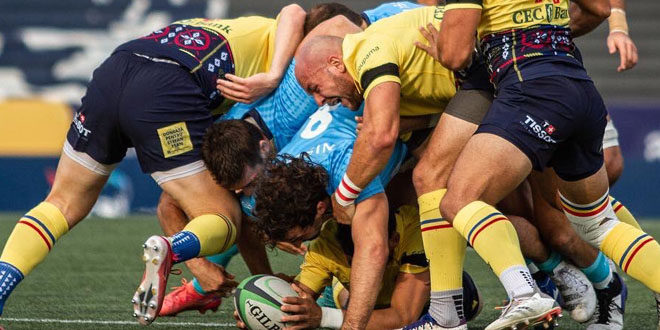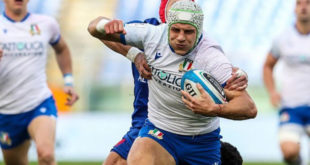Romania play host to Chile on Sunday in Bucharest. The match is the third of 2022 between the teams; this is unprecedented. It is highly healthy for rugby to have such a rivalry now established. Uruguay and Romania are vital to rugby’s contemporary and future development.
The Stejarii go in to the match following a win last weekend over Los Cóndores. Romania started well against Chile; however, having held a 17-0 lead Chile fought back with the final result being 30-23 to the Europeans. Meanwhile, Uruguay started the November Internationals with a 34-18 loss against Georgia in Tbilisi.
Romania have competed in twice as many Rugby World Cups as Uruguay. The Stejarii were apart of the inaugural Rugby World Cup in 1987 and all tournaments up until 2019. A scandal broke out revelaing that center Sione Faka’osilea was not eligible. He competed in RWC qualifiers wherein Romania qualified only to be disqualified thereafter.
Both Belgium and Spain were also guilty of breaching player eligibility laws in Europe’s qualifying matches. Unfortunately for Rugby Europe and World Rugby, it was not an isolated occurance. Spain was disqualified from RWC 2023 after Gavin van der Berg had played against lightweights the Netherlands while not being eligible. Spain’s loss was Romania’s gain and saw Portugal given a last opportunity in repechage.
Uruguay qualified as Americas 1. The historic achievement saw Los Teros defeating Brazil, Chile and the USA. The prize was a place in Pool A against hsots France in addition to Italy, Namibia (Africa 1) and New Zealand. Uruguay’s improvement is directly associated with the domestic high performance system, foreign coaching expertise and a homegrown player base.
Homegrown is not a choice but the reality. Uruguay has embraced it to become permanently ranked in the world’s top 20. Romania went from entirely homegrown at Rugby World Cup 2011 to elimination from the 2019 tournament following an error. Lessons were learned; however, Romania has continued to approach foreign players. World Rugby permitted Jason Tomane to play despite not competing residency. This is nothing compared to what has unfolded elsewhere; New Zealand’s Augustine Pulu now plays for Tonga and Australia’s Jack Demspey now plays for Scotland.
Part of the reason for Romania utilizing player eligibility laws is because the junior system and the country’s system by and large is weak compared to others both in Europe and in general terms. Lifting the level of the player base has had the consequence of Romania capping players from countries including New Zealand, South Africa, and Tonga.
Romania has notably more homegrown players than Tonga; the country lacks any comparative source such as that which sees All Blacks now playing for Tonga. New Zealander Hinckley Vaovasa starts at fullback, Tonga’s Fonovai Tangimana center and South African Johan van Heerden plays moves from flanker to second-row.
Scrum-half Florin Surugiu will reach the milestone of 100 caps. The 37-year-old woill have the honor of reaching the mark in his home town of Bucharest. Coincidentally, Surugiu made his debut for Romania against Uruguay in 2008.
Meanwhile, Uruguay’s line-up to face Romania is arguably their strongest since RWC 2019. Many players are back but not all; Santiago Arata and Nicolás Fretias are the key absentees. Quite simply, a similar side is likely to play against Italy at the World Cup.
Mateo Sanguinetti earned his 76th cap. This sees him joining Leandro Leivas and Mario Sagario to become the joined third most capped Tero. The second most capped is Gastón Mieres who will earn his 80th cap playing wing. The most capped player is Diego Magno who will earn his 102nd as Uruguay’s replacement lock.
Uruguay’s formation has French-based players Germán Kessler, Manuel Leindekar, Felipe Berchesi, and captain Andrés Vilaseca. Santiaga Arata and Nicolás Freitas also play in France.
Romania and Uruguay split the July test match series. Romania won game one 30-22 in Montevideo while Uruguay were 26-20 matches at the same venue on the following weekend. While the November match is not part of the same series it might as well be. It is a prime opportunity for both teams and all players ahead of the World Cup.
TEAMS

ROMANIA
1 Vasile Balan, 2 Ovidiu Cojocaru, 3 Gheorghe Gajion, 4 Johan Van Heerden, 5 Marius Iftimiciuc, 6 Kamil Sobota, 7 Mihai Macovei (capt.), 8 Cristi Chirica, 9 Florin Surugiu, 10 Vlăduț Popa, 11 Atila Septar, 12 Fonovai Tangimana, 13 Alexandru Bucur, 14 Nicolas Onuțu, 15 Hinckley Vaovasa
Replacements: 16 Tudor Butnariu, 17 Mihăiță Lazăr, 18 Alexandru Gordaș, 19 Lucian Ionuț Mureșan, 20. Damian Strătilă, 21 Gabriel Rupanu, 22 Daniel Plai, 23 Robert Neag

URUGUAY
1 Mateo Sanguinetti, 2 Germán Kessler, 3 Ignacio Peculo, 4 Ignacio Dotti, 5 Manuel Leindekar, 6 Manuel Ardao, 7 Santiago Civetta, 8 Manuel Diana, 9 Tomás Inciarte, 10 Felipe Berchesi, 11 Gastón Mieres, 12 Andrés Vilaseca (capt.), 13 Felipe Arcos Pérez, 14 Baltazar Amaya, 15 Felipe Etcheverry
Replacements: 16 Guillermo Pujadas, 17 Matías Benítez, 18 Mathías Franco, 19 Diego Magno, 20 Lucas Bianchi, 21 Santiago Álvarez, 22 Rodrigo Silva, 23 Juan Manuel Alonso
Date: Sunday, November 13
Kick-Off: 5:30pm (RO); 12:30pm (UY)
Venue: Stadionul National Arcul de Triumf (Bucharest, RO)
Referee: Pierre Brousset (FR)
Assistant Referees: Jean Baptiste Nuchy (FR); Adrien Marbot (FR)
TMO: Sean Brickell (UK)
HISTORIC RESULTS
2022-07-17 – Uruguay 26-20 Romania (Montevideo, UY)
2022-07-17 – Uruguay 22-30 Romania (Montevideo, UY)
2021-11-07 – Romania 29-14 Uruguay (Verona, IT)
2018-11-24 – Romania 20-27 Uruguay (Baia Mare, RO)
2016-11-06 – Romania 36-10 Uruguay (Bucharest, RO)
2016-06-13 – Romania 40-0 Uruguay (Bucharest, RO)
2014-06-14 – Romania 34-16 Uruguay (Bucharest, RO)
2012-06-08 – Romania 29-9 Uruguay (Bucharest, RO)
2010-11-27 – Romania 39-12 Uruguay (Bucharest, RO)
2010-11-13 – Uruguay 21-21 Romania (Montevideo, UY)
2009-06-12 – Romania 17-11 Uruguay (Bucharest, RO)
2008-06-11 – Romania 10-6 Uruguay (Bucharest, RO)
 Americas Rugby News Rugby news from across the Americas!
Americas Rugby News Rugby news from across the Americas!




